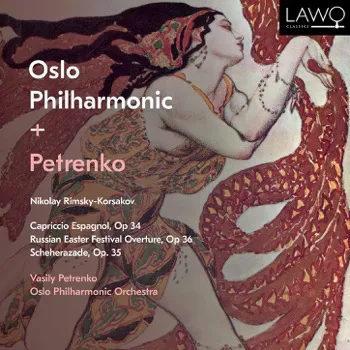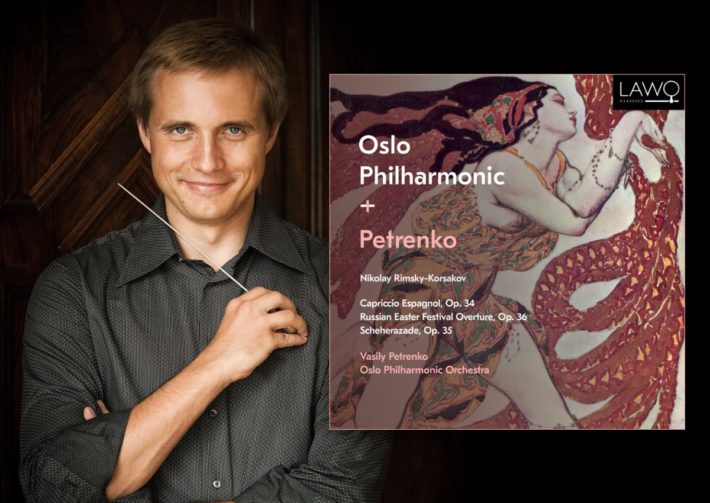Of all the late romantic Russian composers, none quite conjure the magical, vibrant swathes of sound like Rimsky-Korsakov. In his latest LAWO release with the Oslo Philharmonic, Vasily Petrenko focuses on a trilogy of pieces from this seminal composer.

Beginning with “Capriccio Espagnol”, this is very much seen through a lens from afar, the Spanish elements are obvious, but tinged with aspects of Russian folk music. This recording brims with energy in the opening movement (“Alborada”); the percussion of the Oslo Philharmonic capturing the spirit of the dance, more so than on Mariss Jansson’s version with London Philharmonic Orchestra. Petrenko’s strength can often be in slow music, as in his Stravinsky’s “The Firebird”; the stately second movement (“Variazioni”), is broadly paced. In contrast, Jansons is lilting. Initially seeming slow, Petrenko’s horn melodies are more languorous, slightly more muted, capturing the heat of an Andalusian night. Jansons’ gypsies in the fourth movement are slightly less gritty, but there is not much between them in these vivid depictions. Petrenko’s “Fandango” is sympathetically paced. The clarity of the Oslo percussion and string makes a spirited and exciting fiesta of riotous Spanish color.
Flying eastwards and submerging in the vivid displays of the Orthodox Church, “The Russian Easter Festival Overture” is at the center of the program. Petrenko’s experiences as a chorister in St Petersburg come to the fore here in bringing authenticity to the chant-like melodies, used throughout the piece. This is a highly spirited and effervescent reading, in which the group brings the drama of the processions to life. The acoustics of the Oslo Concert Hall are more obvious here than elsewhere on the album, adding just a little more atmosphere.
Tracking south, the final destination on this tour is reached — the Arabian Peninsula. Based on the tale of a thousand and one nights, “Scheherazade” is a blaze of orchestral colors. The sights and sounds of Arabia are vivid in Petrenko’s mysterious and poetic take, in a version that is personal and communicative, but most of all persuasive. The introduction to “Scheherazade” is dark, sinister and brooding, giving way to a foreboding and undulating flow as Petrenko’s “The Sea and Sinbad’s Ship” lighten in tone. The monochrome colors fade into a haze of misty sea air; tinged in shades of aquamarine, the carefully controlled dynamics and hues adjust subtly but noticeably as Sinbad’s Ship sails majestically into view.
“The Tale of the Kalendar Prince” has some gentle rubato aiding to the programmatic and storytelling aspects of the piece. “The Young Prince and the Young Princess” is melodious and beguiling, but Petrenko maintains a pensive air of mystery throughout. The final movement, “Festival of Baghdad-The Sea-The Shipwreck”, is not necessarily as raucous as some performances, but does fit entirely with Petrenko’s unified vision and insight, making this a fitting conclusion to the album.
The engineering is close and rather cinematic in both “Capriccio Espagnol” and “Scheherazade”, which suits the style of the music. In “Scheherazade”, most obviously, the solo instruments sound very close and immediate, not always creating the wide orchestral panorama this music needs.
The playing from the Oslo Philharmonic is flawless. All the solos are played with sophisticated levels of expression; phrasing throughout is architectural, but not predictable. String tones are varied and percussion timbres are nicely chosen, adding something distinctive to Petrenko’s vision. The informative booklet essay is approachable and complements these highly enjoyable performances.
Rimsky-Korsakov:
Capriccio Espagnol, Op. 34
Russian Easter Festival Overture, Op. 36
Scheherazade, Op. 35, Symphonic Suite
The Oslo Philharmonic
Vasily Petrenko – Conductor
LAWO Classics, CD LWC 1198




















